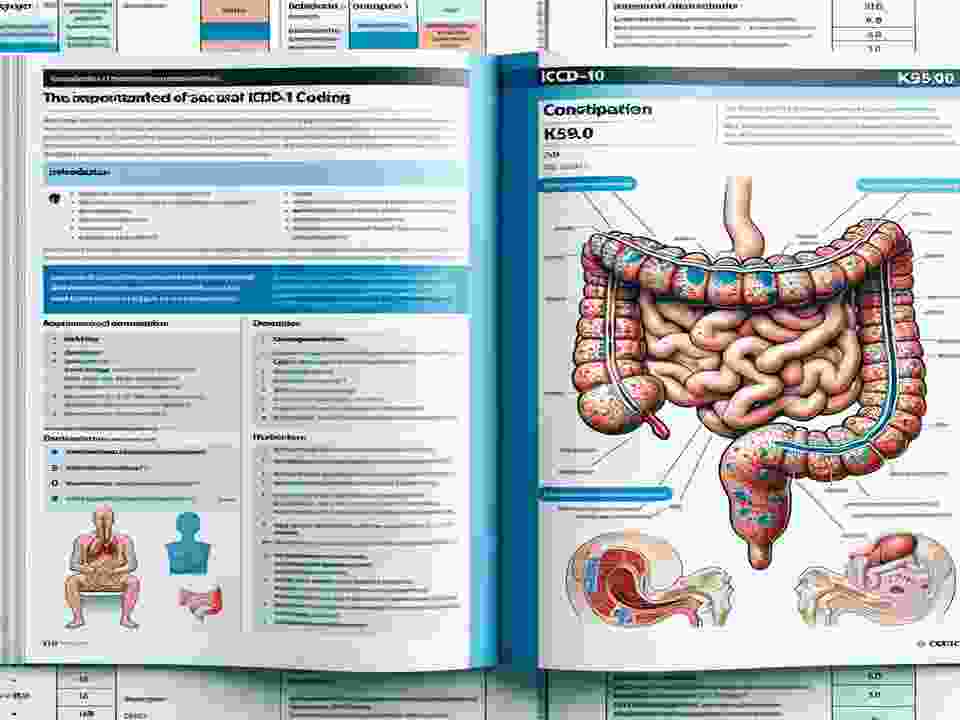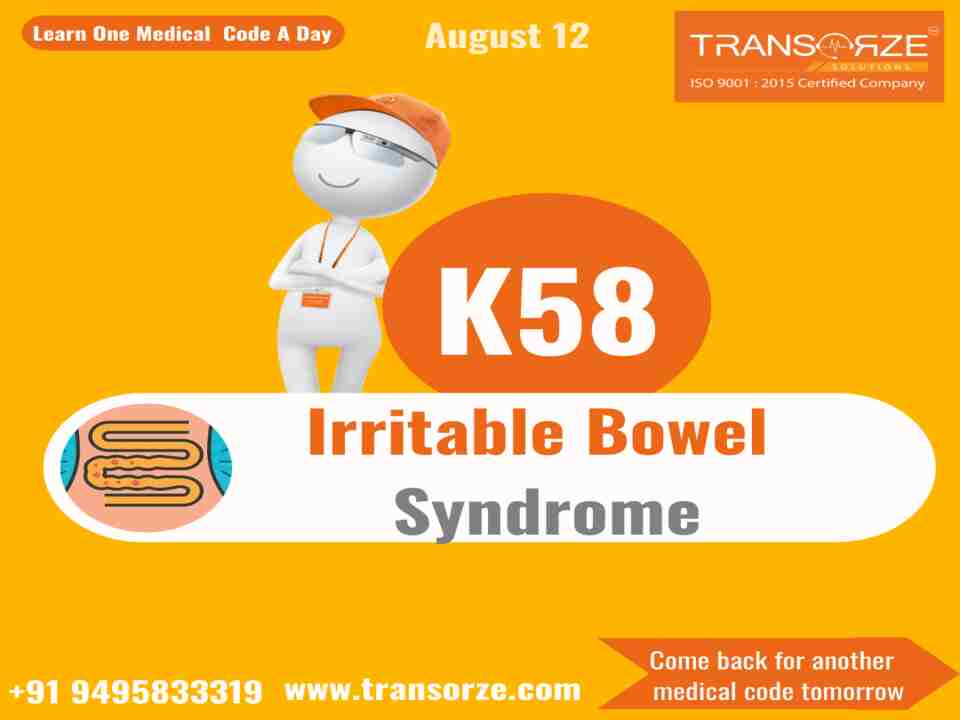
Table of Contents
ToggleIntroduction
Icd 10 code for constipation, a common digestive system disorder, features prominently in medical coding and diagnosis.
In the realm of ICD-10 coding, specific codes are allocated for various conditions, including ICD 10 code for constipation, to facilitate accurate documentation and reporting.
Understanding Icd 10 code for constipation is crucial for healthcare professionals to ensure proper diagnosis and treatment plans.
The ICD-10-CM/PCS MS-DRG v41.1 Definitions Manual serves as an essential resource, providing comprehensive guidelines for bowel dysfunction codes.
This information aids in navigating the complexities of medical coding, ultimately enhancing patient care and administrative accuracy.
The Importance of Accurate ICD-10 Coding for Icd 10 code for constipation
Accurate coding in the medical field cannot be overstated, particularly when diagnosing and treating conditions as seemingly straightforward as Icd 10 code for constipation.
Within the ICD-10 classification system, Icd 10 code for constipation is detailed under code K59.0, a descriptor that categorizes it as a digestive system disorder, critical for both clinical documentation and billing processes.
This specificity allows healthcare providers to communicate effectively, ensuring that patients receive the correct treatment and that claims are processed efficiently by insurance companies.
Understanding ICD-10 Codes
ICD-10 codes, the 10th revision of the International Classification of Diseases, serve as a global standard for diagnosing and coding health conditions.
These codes transcend linguistic and geographic barriers, allowing for the seamless exchange of clinical information worldwide.
For ICD 10 code for constipation, the code K59.0 not only identifies the condition but also aligns with clinical guidelines for diagnosis and management.
The code helps in the stratification of severity, which is vital for tailoring treatment plans to individual patient needs.
Why Accurate Coding Matters
The benefits of accurate ICD-10 coding extend beyond proper patient care; they are also crucial for the administrative aspects of healthcare delivery.
Accurate codes like K59.0 for Icd 10 code for constipation ensure that healthcare providers are reimbursed for their services, supporting the sustainability of healthcare practices.
Furthermore, these codes contribute to the compilation and analysis of health trends, informing policy decisions and public health interventions.
By maintaining high standards for coding accuracy, the healthcare industry ensures that both clinical and administrative operations are based on precise and meaningful data, ultimately enhancing the quality of care provided to patients.
Decoding the Icd 10 code for constipation
The International Classification of Diseases, Tenth Revision (ICD-10) is a critical tool in the world of healthcare, providing a systematic approach to coding various medical conditions for purposes ranging from insurance billing to global health statistics.
Understanding the Icd 10 code for constipation is essential for healthcare professionals to accurately document patient diagnoses, guide treatment plans, and facilitate billing processes.
The Specific Code for ICD 10 Code for Constipation
Icd 10 code for constipation, a common digestive system disorder, is classified under the ICD-10 code K59.00.
This code is designated for unspecified 10 codes for constipation, allowing healthcare providers to categorize cases of ICD 10 code for constipation that don’t have an identifiable cause.
This code must be used accurately in patient records to ensure proper diagnosis, treatment, and reimbursement procedures.
The code falls within a broader category of codes related to functional intestinal disorders, showcasing the meticulous nature of the ICD-10 system in differentiating between various gastrointestinal conditions.
Comparing Codes for Related Bowel Dysfunctions
Within the realm of bowel dysfunctions, several ICD-10 codes are worth noting in comparison to the code for Icd 10 code for constipation (K59.00).
For instance, irritable bowel syndrome (IBS) is classified under codes ranging from K58.0 to K58.9, depending on the presence of diarrhea.
Additionally, codes such as K59.1 for functional diarrhea and K59.3 for megacolon give insight into the specific nature and severity of bowel dysfunction being diagnosed.
Comparing these codes highlights the ICD-10 system’s comprehensive approach to categorizing digestive disorders, enabling healthcare providers to document and treat a wide array of bowel-related conditions with precision and clarity.
The Diagnostic Process for Icd 10 code for Constipation
Icd -10 code for constipation is a widespread condition affecting individuals of all ages, characterized by infrequent bowel movements or difficulty in passing stools.
The diagnostic process for ICD 10 code for constipation begins with a comprehensive assessment of the patient’s medical history, including dietary habits, physical activity level, and any underlying health conditions that might contribute to the problem.
Healthcare professionals typically perform a physical examination to evaluate abdominal bloating, and the presence of any masses, and to assess the rectal area for signs of blockage or nerve damage.
Clinical Findings and Diagnosis
Clinical findings for Icd 10 code for constipation may include reports of fewer than three bowel movements per week, hard or lumpy stools, straining during bowel movements, and a sensation of incomplete evacuation.
The diagnosis of ICD 10 code for constipation is primarily based on these symptoms, supported by physical examination findings.
In some cases, additional tests such as blood tests, colonoscopy, or an abdominal X-ray may be conducted to rule out other causes of bowel dysfunction or to identify underlying conditions like irritable bowel syndrome (IBS).
The Role of ICD-10 Codes in Diagnosis
In the realm of medical documentation and billing, the International Classification of Diseases, Tenth Revision (ICD-10) plays a crucial role.
The Icd 10 code for constipation is K59.00, classifying it within the category of digestive system disorders. These codes ensure that healthcare providers can accurately document the diagnosis of Icd 10 code for constipation in patient records, facilitating effective communication among healthcare professionals and supporting the billing process for services rendered.
ICD-10 codes like K59.00 help in tracking epidemiological data, analyzing health care trends, and in the research and development of new treatment strategies for Icd 10 code for constipation and related bowel dysfunction conditions.

Expansion on Diagnostic Criteria and Coding Specificity:
While your blog mentions the use of K59.0 for unspecified constipation, there’s an opportunity to delve deeper into the nuances of constipation subtypes and their respective codes.
For instance, K59.01 (Slow transit constipation) and K59.02 (Outlet dysfunction constipation). These distinctions are vital for clinicians to provide targeted treatment plans.
Linking Constipation with Comorbid Conditions:
Constipation often coexists with other medical conditions, which can complicate diagnosis and treatment.
Highlighting codes for common comorbidities, such as diabetes (E08-E13) or hypothyroidism (E03), could provide a more holistic view of patient care and coding practices.
Recent ICD-10 Updates and Implications:
The ICD-10 coding system is regularly updated to reflect advances in medical knowledge.
Discussing recent updates related to digestive system disorders, including any new codes introduced or revisions to existing codes, could be valuable.
This ensures that your readers are informed about the latest coding practices and how these changes may impact diagnosis and billing processes.
Practical Coding Examples and Case Studies:
Incorporating case studies or examples of how specific ICD-10 codes for constipation are applied in real-world clinical scenarios could enhance understanding.
This could include anonymized patient histories, diagnostic processes, and how coding choices influenced treatment outcomes.
Technology and Coding Accuracy:
Discussing the role of electronic health records (EHRs) and coding software in improving coding accuracy and efficiency could offer insights into the technological aspects of medical coding.
How these technologies are evolving to better support coders and clinicians in the accurate documentation of patient care is a crucial element of modern healthcare.
Global Perspective on ICD-10 Coding for Constipation:
Given that ICD-10 is used internationally, a comparison of coding practices and guidelines for constipation in different countries could provide an interesting angle.
This might include how cultural differences in diet and healthcare access influence the prevalence of constipation and its coding.

ICD-10 Coding Guidelines and Resources:
The advancement in medical documentation and coding practices brought by the ICD-10 coding system has significantly enhanced the accuracy of diagnosis and treatment procedures.
Specifically, for Icd 10 code for constipation and bowel dysfunction disorders, ICD-10 provides a clear and structured framework that healthcare professionals can follow.
This precision in coding is vital for ensuring that patients receive proper care and that medical billing processes are accurately managed.
Utilizing the ICD-10-CM/PCS MS-DRG v41.1 Definitions Manual
The ICD-10-CM/PCS MS-DRG v41.1 Definitions Manual is an essential resource for coders specializing in digestive system disorders such as Icd 10 code for constipation.
It is meticulously designed to support healthcare professionals by offering comprehensive codes that cover a wide range of symptoms, causes, and conditions related to bowel disorders.
By referring to this manual, coders can guarantee that they are using the most up-to-date and precise codes, thereby avoiding common coding errors that could lead to misdiagnosis or incorrect billing.
Leveraging Resources from the AHA Central Office
The American Hospital Association (AHA) Central Office serves as the official U.S. clearinghouse on medical coding for the ICD-10-CM and ICD-10-PCS coding systems. It offers invaluable resources, including the Coding Clinic Advisor Homepage, which provides access to webinars, newsletters, and updates on the latest coding guidelines and practices.
Utilizing these resources allows medical coders to stay abreast of any changes or new codes introduced, particularly those related to gastrointestinal disorders such as Icd 10 code for constipation. This knowledge is crucial for ensuring the accuracy and reliability of medical records and claims.
The Importance of Continuing Education for Coders
Continuing education is paramount for medical coders, especially in the rapidly evolving field of healthcare documentation and billing.
The ICD-10 coding system regularly updates its codes and guidelines to reflect changes in medical science and healthcare delivery methods. Staying informed through continuous learning opportunities helps coders maintain their skills at the highest level.
This not only benefits their career development but also contributes significantly to the overall effectiveness and efficiency of healthcare services, reflecting positively on patient outcomes and satisfaction.

Case Studies and Research Insights
The intersection of medical diagnosis and coding has never been more pertinent than in the realm of bowel dysfunction, a common yet complex condition affecting a significant portion of the population.
The International Classification of Diseases, Tenth Revision (ICD-10), provides a systematic coding system to classify and code all diagnoses, symptoms, and procedures.
For Icd 10 code for constipation, a prevalent form of bowel dysfunction, accurate coding is crucial for treatment, billing, and statistical purposes.
Recent Studies on Bowel Dysfunction and ICD-10 Coding
Recent advancements in the understanding of bowel dysfunction have underscored the importance of precise diagnostic coding.
The ICD-10-CM/PCS MS-DRG v41.1 Definitions Manual is an essential resource, offering comprehensive lists of diagnosis codes related to the digestive system.
The American Hospital Association’s Coding Clinic has been instrumental in disseminating up-to-date coding guidelines, including those for conditions like irritable bowel syndrome (IBS) and Icd 10 code for constipation.
These resources ensure that healthcare professionals remain informed about the latest coding practices, which in turn facilitates effective treatment and management of bowel dysfunction.
Biofeedback as a Treatment Option
In the quest for effective treatments for bowel disorders, particularly 10 code for constipation and fecal incontinence, biofeedback therapy has emerged as a noteworthy option.
Biofeedback aims to improve bowel function by teaching patients how to control physiological processes that are normally involuntary.
Research has shown mixed results, suggesting that while biofeedback can be beneficial for some patients, it may not be universally effective.
Despite this, it represents a promising area of study and underscores the need for individualized treatment plans based on accurate diagnosis and coding.
The Link Between Migraine and Bowel Disorders
Emerging research from South Korea has identified a significant correlation between migraine and the development of inflammatory bowel disease.
This discovery highlights the interconnected nature of bodily systems and the complexity of diagnosing and coding for intersecting conditions.
Understanding these links is crucial, as it can lead to more holistic approaches to treatment and management, encapsulated within the precise framework of ICD-10 coding.
This knowledge not only enriches the database of medical coding but also opens new avenues for comprehensive patient care, integrating insights from neurology and gastroenterology.

Post-COVID Conditions and Bowel Dysfunction
As the medical community continues to navigate the complexities brought about by the COVID-19 pandemic, a notable issue has emerged in the form of post-COVID conditions, colloquially referred to as “long COVID”.
This condition encompasses a wide range of persistent symptoms that some individuals experience well after recovering from the initial infection.
Among these lingering challenges, bowel dysfunction has been identified as a symptom that negatively impacts the quality of life for many.
Understanding Post-COVID Conditions
Post-COVID conditions are a constellation of symptoms that persist beyond the acute phase of infection.
The Centers for Disease Control and Prevention (CDC) emphasizes a patient-centered approach to managing these conditions, advocating for comprehensive management plans tailored to the individual’s specific symptoms and needs.
This holistic perspective is crucial in addressing the multifaceted nature of post-COVID conditions, including digestive system disorders.
The Impact on Bowel Dysfunction Coding
With the emergence of post-COVID conditions, medical coding professionals are faced with the challenge of accurately documenting and coding for a new set of symptoms and diseases.
The ICD-10-CM/PCS MS-DRG v41.1 Definitions Manual and insights from the AHA Coding Clinic play an essential role in guiding the coding process for conditions like bowel dysfunction related to post-COVID complications.
By ensuring precise coding, healthcare providers can better diagnose and treat individuals experiencing post-COVID conditions, ultimately improving patient care and outcomes.
Accurate documentation also assists in research and monitoring efforts, contributing to a deeper understanding of the long-term impacts of COVID-19.
Conclusion
In the realm of medical coding and diagnosis, understanding the correct Icd 10 code for constipation and related bowel dysfunction is crucial.
ICD-10 coding, such as R11.0 for nausea, facilitates accurate documentation, diagnosis, and treatment of digestive disorders.
Medical professionals rely on resources like the Coding Clinic Advisor Homepage and the AHA Central Office to stay updated on coding guidelines.
With the right knowledge and tools, healthcare providers can ensure that patients with bowel dysfunctions receive the comprehensive care they need, emphasizing the importance of precision in medical coding for optimal patient outcomes.
FAQ’s
Q 1: What is the Icd 10 code for constipation?
Answer: The Icd 10 code for unspecified constipation is K59.00. This code is used for cases of constipation without a known cause.
Q 2: Why is accurate Icd 10 code important for constipation?
Answer: Accurate Icd 10 code for constipation ensures effective communication among healthcare providers, correct treatment, efficient insurance processing, and contributes to health trends analysis and policy making.
Q 3: How do healthcare professionals diagnose constipation?
Answer: Diagnosis begins with a patient’s medical history and physical examination, focusing on bowel movement patterns, diet, and lifestyle. Tests like blood work or colonoscopy may be used to rule out other conditions.
Q 4: Can Icd 10 code for constipation vary based on the underlying condition?
Answer: Yes, the Icd 10 code for constipation can vary to reflect specific types of constipation, such as slow transit or outlet dysfunction, and conditions that may cause constipation, like hypothyroidism or diabetes.
Q5: Where can healthcare professionals find resources for Icd 10 code for constipation?
Answer: Resources include the ICD-10-CM/PCS MS-DRG v41.1 Definitions Manual, the American Hospital Association’s Coding Clinic Advisor, and continuous education programs focusing on ICD-10 coding updates and guidelines.
